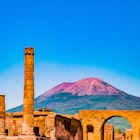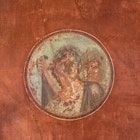
Feb 17, 2022 • 3 min read

Mar 17, 2023 • 6 min read

New discoveries and reopened sites at ancient Pompeii continue to offer valuable insights into this archaeological treasure trove © MartinM303 / Getty Images
The final moments for Pompeii’s residents unfolded like a horror film.
After Mt Vesuvius blew its top in 79 CE, volcanic ash and lapilli (burning pumice stone) buried the city, followed by waves of hot gas and ash that killed anyone left alive. With such a definitive ending, it might come as a surprise that, after 2000 years, the ghosts of this ill-fated metropolis still have stories to tell.
Many of the site’s recent discoveries are thanks to the Great Pompeii Project, a multi-year effort to save the Archaeological Park of Pompeii from decades of damage caused by mismanagement, neglect and climate change. The latest techniques used by archaeologists to study Pompeii – from ground sensors to CAT scans – have drawn amazingly precise pictures of the city’s past, offering valuable insights into this archaeological treasure trove.
Today, visitors can glimpse previously excavated homes that spent years closed to the public or eye new excavations in Regio V, which opened in 2021.
“Pompeii is a place where you walk around and you don’t have to imagine [what the city looked like] – you can actually see everything,” says Fiorella Squillante, tour guide for the Vesuvius vs Pompeii company and author of the children’s book Pompeii is Cool! Wander past Regio V’s street-side snack stand to see what was on an ancient lunch menu. Enter extravagant villas, and the voices of former residents seem to bounce off Pompeiian-red walls.
Here are the most exciting new attractions that give Pompeii’s doomed residents a voice from beyond the grave.

The restored remains of this lavish home, reopened in January after a 20-year closure, reveal why park director Gabriel Zuchtriegel has dubbed it “the Sistine Chapel of Pompeii.” Fresco-filled walls depict scenes both mythological and erotic: Hercules crushing two snakes, winged Cupids hard at work, and Priapus, the fertility god, weighing his enormous penis on a scale loaded with money.
The image of Priapus is more than just suggestive: it’s a symbol of health and wealth reflecting the home’s former owners, Aulus Vettius Conviva and Aulus Vettius Restitutus. After these two formerly enslaved men were freed, they became successful merchants in the agriculture and wine trades. Adorning their walls with important cultural icons like Priapus showcased their social ascent.
A serene mural of Venus fishing alongside Eros tells a far sweeter story than the roughly 10 skeletons discovered here in 2018. The art is beautiful indeed – yet the home’s fate is bone-chilling.
Located in Regio V, the structure is named for its once-leafy courtyard surrounded by paintings of plants. But its most historically significant feature is a date scrawled on a wall in charcoal: the Roman equivalent of October 17. Charcoal is a fragile material unlikely to survive for very long, making archaeologists believe the note was written just a few days before the volcanic event, which then preserved the text. This finding places the eruption of Vesuvius in October: two months after the previously estimated date of August 24.
This suspected brothel, discovered in 1933 and closed to the public in 1980 following the Irpinia earthquake, reopened in 2020. Visitors can peep at the preserved second floor and read the inviting inscription beside the entrance: “Amantes, ut apes, vita(m) mellita(m) exigunt. Velle” (Lovers like bees pass a sweet life like honey. I wish it were so). Artifacts uncovered on-site, including a bronze lamp and a brazier, can be seen in the building’s first-floor atrium.
Fiorella says this is a Pompeii must-see. “It’s on a back street, so it’s never that crowded,” she says. “The kitchen is in perfect condition, and the graffiti mentioning the lovers is quite nice.”
Pompeii’s permanent exhibition space opened in 1873 but closed to the public in 1980 after significant earthquake damage. It fully reopened in 2021, showcasing what Fiorella calls an “unmissable” collection of trinkets, frescoes, casts of victims unearthed in the city and other artifacts.
One of the casts, of two people locked in an eternal embrace, was initially referred to as the “Two Maidens” until a 2017 CAT scan and DNA test revealed that they were in fact two young men. Their strong embrace suggests a deep emotional connection, though the nature of their relationship remains lost to time.

A partially excavated wall near the northern border of Regio V exposes a bedroom with an erotic fresco depicting the mythological tale of Leda and the Swan. In the painting, Jupiter, disguised as a swan, perches on the half-naked Spartan queen’s lap. Leda stares out at her real-life audience, turning the myth into a modern act of voyeurism.
“Most of the house remains buried,” says Fiorella, “but you can see some of the walls sticking out from the volcanic debris and understand the power of the eruption in 79 AD.”
Archaeologists in the early 19th century ran into a big problem while excavating Pompeii: the erotic art they found (phallus sculptures, licentious satyrs, hedonistic nymphs) offended their prudish sensibilities. As a result, Pompeii’s sex-centered artwork spent generations locked in a secret room, where only scholars (or men willing to pony up some lira) were allowed to see the provocative works.
Today, seeing Pompeii’s sexy side only requires a ticket to this exhibition, open through September 3, 2023. Art and Sensuality in the Houses of Pompeii features 70 paintings shown together for the first time, including two bronze medallions from a Roman chariot found on site in 2021.
A stew made from snails, fish and sheep was all the rage in the first century – at least if you were grabbing a bite at this snack stand, or thermopolium, which opened to visitors in 2021. Although Pompeii has 80 similar street-facing restaurants, this site is notable because of its impeccable preservation – including the animal bones and snail shells from which archaeologists hypothesized the stew’s briny ingredients.
The thermopolium is strikingly similar to a modern salad bar: terracotta jars set into the counter resemble those at a fast-food joint, while intact frescoes showcase familiar menu items like duck. There’s even a potty-mouthed slur scribbled across the painting of a dog collar. “Whether [the graffiti] is ironic or offensive, we don’t know,” says Fiorella. Still, one thing remains clear: after 2000 years, human beings’ sense of humor remains essentially the same.

Fiorella suggests purchasing a ticket in advance, checking online to see which buildings are open, and rounding out a Pompeii trip with a visit to nearby Naples. “Seeing Pompeii is not complete without seeing Naples’ National Archaeological Museum,” she says. The museum exhibits enchanting discoveries from areas buried by Vesuvius.

Archaeology
See inside one of Pompeii's grandest villas as it reopens for the first time in 20 yearsJan 12, 2023 • 4 min read

Feb 17, 2022 • 3 min read



Jan 4, 2021 • 2 min read




Feb 19, 2020 • 2 min read

Oct 24, 2019 • 2 min read